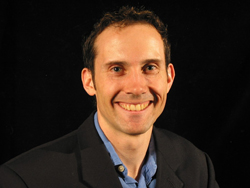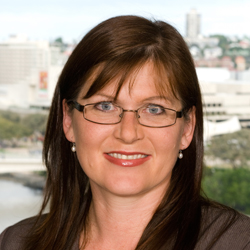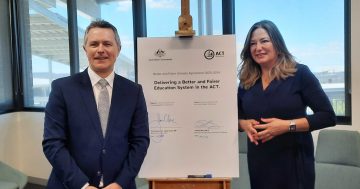
Recently elected Labor MP, Andrew Leigh, has declared his support for maintaining current levels of Commonwealth Government funding to high-fee private schools. In response to repeated questions from members of the public at a ‘community education forum’ on Wednesday night, the former ANU economist insisted that government support for extreme high-fee private schools is a matter of fairness.
The Government’s My School web site indicates that Sydney Grammar has an income of $30,000 per student per year. Public schools in Leigh’s electorate typically have about a third of this amount to spend on their students despite the kids coming from significantly less privileged backgrounds than those at the Sydney private school. Leigh made it clear he does not believe that government funding in excess of $3000 a year per student to Sydney Grammar should be reallocated to schools on his watch like The Charnwood-Dunlop School and The Amaroo School.
Leigh initially defended the largesse in terms of the money private school students save the public purse. When it was pointed out to him that it is unlikely that parents who are prepared to lash out $27,000 a year on their child’s education are going to be less inclined to do so for the lack of $3000 government dollars annually, Leigh shifted ground.

[Sydney Grammar’s income, 2009 on http://www.myschool.edu.au/ ]
Leigh said it was a matter of fairness that all schools – regardless of fees charged – receive public funding. To support this view the MP used the analogy of publicly-funded roads in Vaucluse. For Leigh, as we are prepared to publicly fund roads for all, so we should publicly fund private schools. Readers will immediately notice how poorly chosen this analogy was. The appropriate analogy would be public funding of private roads in Vaucluse – ones that the majority of Australians were prohibited from using. We, of course, do not do this because it’s patently unfair. Leigh’s analogy would be useful in support of arguments for providing free public education to all Australians, even wealthy ones. But the analogy does nothing to justify the local member’s defense of Commonwealth Government funding of Sydney Grammar.
What does Andrew Leigh mean when he talks about equity?
Leigh’s position is particularly surprising given his stated commitment to equity and his rhetorical championing of the role of education in fighting poverty. Leigh has publicly stated
“One of the roles of government is to recognise that for many people, especially kids born into poor families, there’s a clear role for governments to spend resources to make sure we have equal opportunities across society… that the lottery of life as to where you start doesn’t determine where you end up.”
It’s difficult to know what Leigh means by a governmental role in equalising opportunity when he supports government funding that exacerbates rather than ameliorates resource disparities in education.
Leigh: public funding, no strings attached
Others in attendance at Leigh’s community forum, held at the Gungahlin Lakes Club, asked about public obligations in return for public funding. As Tony Moore commented in The Australian recently;
“Governments… have been strangely loath to demand their subsidised private providers in return meet community obligations akin to the obligations that government schools must meet.”
In this regard, Leigh was no exception. He did not respond to the invitation to specify what governments might expect from private schools in return for public funds (expanded scholarship schemes? proportionate percentage of disadvantaged students? reduced fees?) other than to express his opposition to tying funding to fees.
Leigh’s (qualified) criticism of over-funding
Leigh did express in-principle opposition to funding in excess of what the SES formula would entitle schools to. He specifically accepted that the massive over-funding of Burgmann Anglican College should cease.
However, even here, Leigh made significant qualifications. Leigh argued that over-funded schools like Burgmann, Daramalan College and Radford College should have their funds frozen rather than reduced. He rejected the idea of a 2-3 year transition period after an announcement. Bear in mind, the Labor Government have committed to maintaining the Howard funding arrangements until the end of 2013, seven years from Kevin Rudd’s election. Then – if they’re still in office – the only weapon Leigh and the Gillard Government would wield in the name of fairness is inflation.
Leigh takes time out to misrepresent the AEU
In championing the Government’s education agenda, Leigh represented the Australian Education Union (AEU) and its nearly 200,000 members as resisting transparency. He went on to welcome the fact that the AEU had responded to My School 2.0 by calling for more information, not less. In fact, the AEU has never called for ‘less information’ or less transparency – they attacked a web site that was inaccurate and inadequate. The Union has lobbied for accurate financial information, use of school enrolment data to more accurately build a picture of student populations and mechanisms to prevent crude and harmful league tables – the very improvements which have begun to be made in the new version of the web site.

Senator Kate Lundy appeared to participate in this misrepresentation. I know first-hand Lundy is acutely aware of the AEU’s actual objections. At a pre-election meeting of the ACT AEU branch Lundy expressed a great deal of sympathy for the arguments made by union members against My School as it was. When I spoke to Lundy after the Leigh forum she distanced herself from a representation of teachers as anti-transparency. I did not get a chance to get any clarification from Leigh.
In conclusion – hmmm
Leigh wins points for hosting the forum at all and choosing to focus on education. However, it was disappointing that his answers occasionally involved attacking straw men. In response to questioning about funding of extreme high-fee private schools, Leigh’s strategy was to attack the idea – that nobody had proposed – of abolishing all funding to all private schools. In face of comments that public schools do a disproportionate burden of the ‘heavy lifting’, Leigh attacked the idea – that nobody had proposed – that all public school students are worse off than all private school students. This approach was unfortunate because it reduced the quality of the exchange. More fundamentally, it is concerning that a Labor member in a Labor town in front of an almost wholly pro-public education audience, is so reluctant to acknowledge the basic inequity of current funding arrangements. It does not bode well for the prospect of the Gillard Government delivering meaningful change.





















